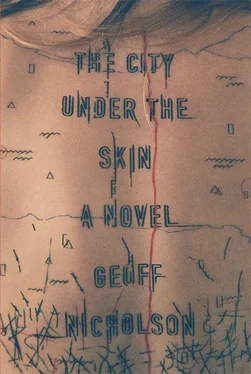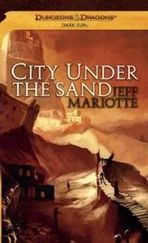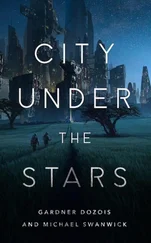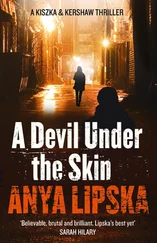“Oh go on,” said the newly tattooed customer.
“Are you trying to get me into trouble?”
“Always,” the woman said, “but you could just do something really small, something nobody would ever see.”
“Like in my armpit,” the kid suggested.
“I don’t think so.”
“Go on, Rose,” said the woman.
It seemed that Rose had a hard time saying no to her.
“Okay, but not the armpit. Kid, gimme your hand.”
Eagerly, he extended his right hand, balled into a fist. He was already picturing a Viking or a fireball or a winged serpent emblazoned across his knuckles, but Rose grabbed the hand, rolled it over, and opened it up, and as quickly and as perfunctorily as possible, she tattooed a cluster of small, blue-black ink marks on his palm: a circle, and a pair of crossed lines, one of them an arrow marked with an N for north.
“What’s that?” he asked.
“That’s a compass rose,” she said. “And if anybody asks, you did it to yourself.”
“Okay,” he said. But nobody did ask. He went home, went back to his mother, didn’t say anything about the chase, or about Rose or the tattoo, and neither his mother nor anybody else ever said to him, “What’s that on your palm?” No doubt there were other kids whose lives included the inspecting of hands, for cleanliness, honesty, maybe even punishment, but he had none of that. He kept his hand to himself. He looked at it only when he was alone, when he was sure nobody else was looking. Still, that was often enough to realize, all too soon, after just a couple of weeks, that the tattooed marks were fading.
At first he felt disappointed, then cheated. Rose must have known this would happen, that the marks would disappear. Later, he learned that’s what always happens to tattoos on the palm of the hand: they won’t stick, they just fade away. Rose had tricked him, treated him like a child. That really pissed him off. But then he started to feel differently about it. Maybe Rose had been pretty smart. She’d done the job, done what he and her friend had asked of her, and yet she’d also allowed for a reversal, for a kid’s change of heart, and, of course, she was protecting herself too.
He needed to talk to her about this, and off he went, threading his way into the city to find her again, attempting to retrace the route that had taken him to her studio that day. Naturally, he’d had other things on his mind at the time, but even so, he was amazed how unfamiliar the whole area now looked, how hard it was to find a landmark that told him he was anywhere near the right place. He was pretty sure he’d found the bus stop where he first encountered his pursuers, and he had a sense of the direction he’d gone from there, so he headed that way now, but immediately he started to think he must be mistaken. The shapes of the buildings looked wrong, the streets weren’t this narrow, he didn’t remember that church or that convenience store. Perhaps he hadn’t come this way at all. The kid who never got lost suddenly felt adrift and a very, very long way from home. He spent a whole afternoon covering the district, back and forth, pacing the grid, looking for clues, even buying a map from a corner gas station. And he also kept a lookout for five tall black kids who were good at running and might be eager for revenge. But he found nothing. He was both sadder and angrier than he could understand.
* * *
The endorphin rush from the tattoo on Marilyn’s foot was small scale by most standards, and her eagerness to question Rose, to know what the story meant, cleared away both pain and pleasure. She pushed herself up on the daybed, just about managed to stay, or at least appear to be, calm.
“What was his name, Rose?” she asked. “What was the kid’s name?”
“I don’t know.”
“What do you mean you don’t know?”
“Oh come on,” said Rose. “It was a long, long time ago. A lot of brain cells have died since then.”
“It must be in there somewhere. Maybe we can jog your memory. Was the name Wrobleski?”
“I don’t think so, but I never knew his surname anyway.”
“So you did know his first name.”
“Yes, I did. Once. But I don’t anymore. It’s gone, I’m old. I barely remember what happened yesterday. I’m all used up.”
Unexpectedly, two thin streams of tears ran down from the old woman’s eyes, making their way into the creases on her cheeks and around her mouth, tributaries heading for an inert inland sea.
“How’s your foot?” Zak asked as he guided Marilyn down the stairs of the Villa Nova.
“It hurts,” said Marilyn. “It’s going to hurt for two or three weeks if Rose Scarlatti is to be believed.”
“You think she is?”
“About the foot, sure.”
“And about the rest?”
“I don’t even know what the rest is,” said Marilyn. “Some time in the distant past, some random, nameless, traumatized kid went to Rose Scarlatti’s studio. She gave him a tattoo she knew would disappear. And that gave him a taste for renegade tattooing? So now he’s wandering the streets picking up women and tattooing coded maps on their backs, along with Rose Scarlatti’s trademark, because … because he just likes it? Because it’s a sexual fetish? Because he’s fucking nuts? Sure. Who wouldn’t believe a thing like that?”
“You think the kid was Wrobleski?”
“Even if it was, it doesn’t explain everything else. Maybe I should just go and ask him,” said Marilyn.
“Yeah, right.”
“You think I’m not serious?”
“I don’t know what you are right now, Marilyn. I don’t know why you care so much. I don’t know why you care at all.”
They were at the ground floor. She looked at him with both sympathy and regret.
“I’ll explain,” she said. “But not here.”
“Where?”
“Your place,” said Marilyn. “After we’ve fucked.”
* * *
Zak had taken twenty or so illuminated globes from Ray’s unwanted stock and arranged them strategically around his bedroom, in various places, at different heights, to disguise the exact shape, size, and dreariness of the space. The globes glowed rather than shone, with a pale consistent blue from the expanses of water, quiet browns, greens, and yellows from the landmasses: the poles were plain white. The effect was like being in space, surrounded by a solar system of identical, unmoving planets.
“Quite the bachelor pad,” said Marilyn.
“I do what I can.”
“Oh, I think we can do better than that.”
She took hold of him, tenderly, but with purpose and determination. Her hands moved rapidly down his clothed body, accelerating, a lightning raid, opening buttons, a belt, a zipper, then pulling fabric aside, not stripping him naked, but exposing only the areas she needed. She lay on her back on the dense, grubby blue carpet, and he did for her what she’d done for him: a series of strictly functional openings and unfoldings, all that was needed, just the moving parts. It felt good not to have to think about Marilyn’s house rules.
Afterward Zak rolled onto his back beside her, sweating, breathing hard, pleased with himself. Who needed a road map? He put his arm around her and they stared up at the dark, distant ceiling above the globes. The world felt satisfyingly far away. He knew it wouldn’t stay there.
“Tell me about your grandfather,” he said.
He felt Marilyn’s body clench and slip away. “What?”
“I’ve been doing some research. Karl Driscoll was your grandfather, wasn’t he? And he was the architect who designed the Telstar. Is that why you live there?”
“You’re quite the little gumshoe, aren’t you?”
“I never left my desk. And I still don’t know the half of it. I know he got kicked off the project before it was finished. I know he never built anything ever again. I know he’s not around anymore.”
Читать дальше












